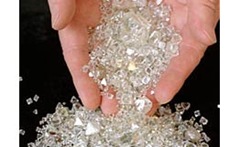Diamonds no longer militants 'best friend'
 The Kimberley Process, an international initiative opposed to the trade in "blood diamonds" - uncut diamonds used to fund conflicts in Africa - met November 5-9 in Brussels for its 5th annual plenary meeting.
The Kimberley Process, an international initiative opposed to the trade in "blood diamonds" - uncut diamonds used to fund conflicts in Africa - met November 5-9 in Brussels for its 5th annual plenary meeting.
The delegates may well be proud: blood diamond sales have dropped sharply in recent years.
And while illicit stones have been squeezed out of the market, the supply of legally sourced diamonds has been unable to keep pace with demand. So the future looks bright (or at least profitable) for legitimate traders in the "girls' best friend".
The Kimberley Process (KP) was launched in 2000, with the support and sanction of the United Nations, by a number of Southern African countries to deal with the problem of so-called conflict or blood diamonds. The diamonds are mined in African conflict zones and used to subsidize various armed groups.
In the seven years since the initiative was founded, 47 countries and the European Union have joined. They represent the main world centers of diamond production, finishing and sales.
Russia, too, is a KP member, while its leading diamond producing company, Alrosa (which accounts for 97% of diamonds mined in Russia and 25% of the world diamond market), subscribes to KP principles.
Since its existence, the initiative has made good progress. The share of conflict diamonds in world diamond output, which only ten years ago was as high as 10%, is now less than 1%.
The successes of the Kimberley Process are largely due to the ending of the civil wars that raged across Africa in the 1990s in places such as Angola (where, incidentally, Alrosa mines diamonds), Sierra Leone, the Democratic Republic of Congo, and Cote d'Ivoire.
Most of these conflicts are now over. The only country on the KP black list today is Cote d'Ivoire, which could also be struck off following the signing of an armistice between the government and rebels in March.
But this does not mean that the members of the Kimberley Process sat idly by waiting for the conflicts to end. In compliance with a UN requirement they introduced tight controls over all the diamonds produced in the world: now every legally sold diamond must have a certificate saying it is not from a conflict zone.
Buoyed by their success, many KP members at the Brussels meeting suggested broadening the initiative's scope.
Until now the Kimberley Process has focused on production. It is now proposed that it also control the trading and cutting of diamonds, including by means of sampling tests and inspections. It has also been suggested that the KP apply its experience with blood diamonds to all forms of illegal trade in the gemstones, such as smuggling.
However, implementation of these proposals will largely depend on the will and desire of one country. That is India, which is the world's main diamond cutting center and has succeeded the EU to the KP one-year chairmanship.
For the first time in many years, the market is experiencing a shortage of diamonds, meaning that those who trade in legal diamonds on the world market can look forward to fabulous profits.
The reason behind the diamond shortage is the same that is pushing up prices for all kinds of raw materials - from grain to oil: the rapid development of China and India.
The newly rich of these countries have both increased their wealth and raised their expectations. In China, which has a population of 1,320 million, 40% of marrying women want to have a diamond ring, and their numbers are growing every year.
Industry experts believe that demand for diamonds on the world market will grow by 5% a year for the next 10 years.
They also predict that it will be impossible to raise output before 2015. Currently exploited deposits are heavily depleted, and it will take time to establish industrial production at new ones - especially as most of them are in former conflict zones.
Therefore the gap between demand and supply will widen in the next few years.
The market has only one way of tackling such an anomaly - raising prices.
RIA Novosti - Opinion & analysis - Diamonds no longer militants' best friend

